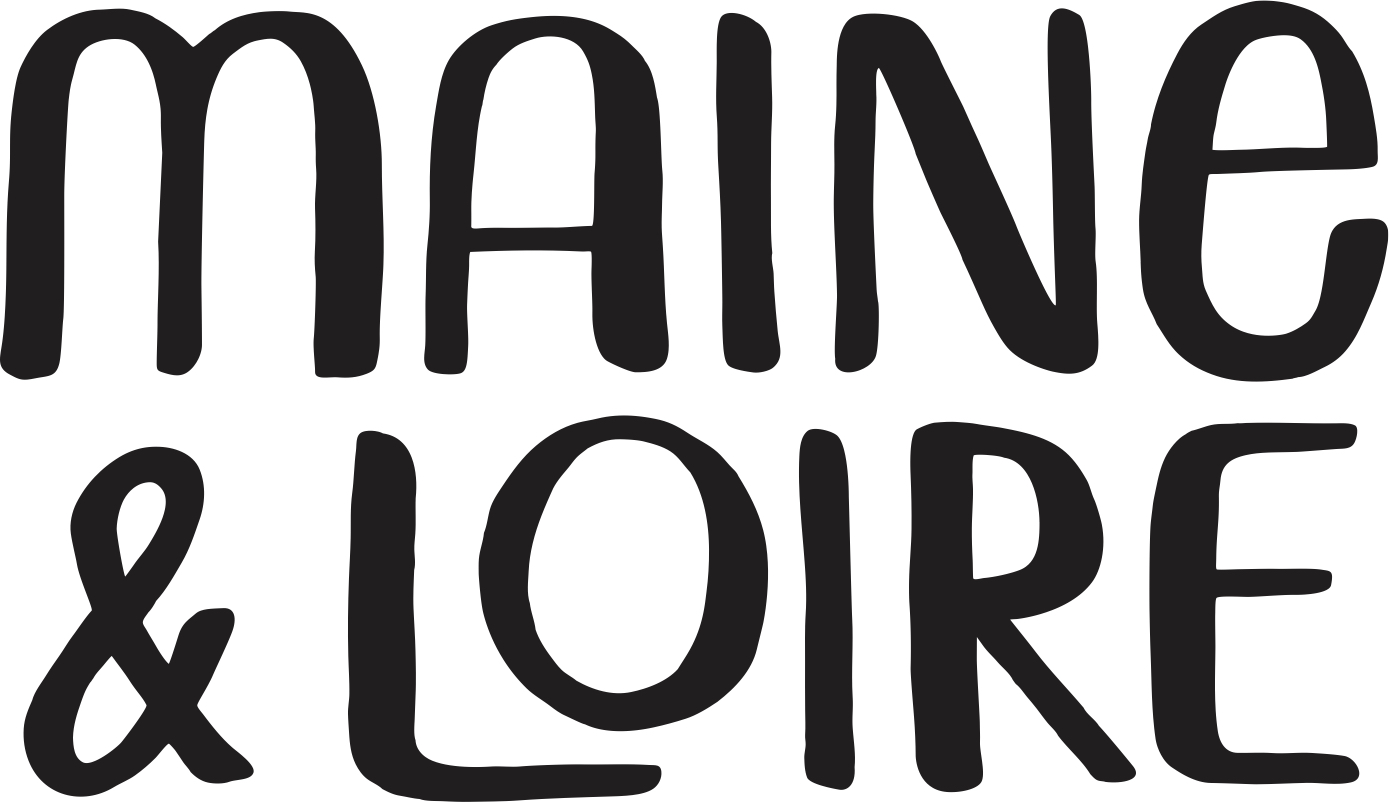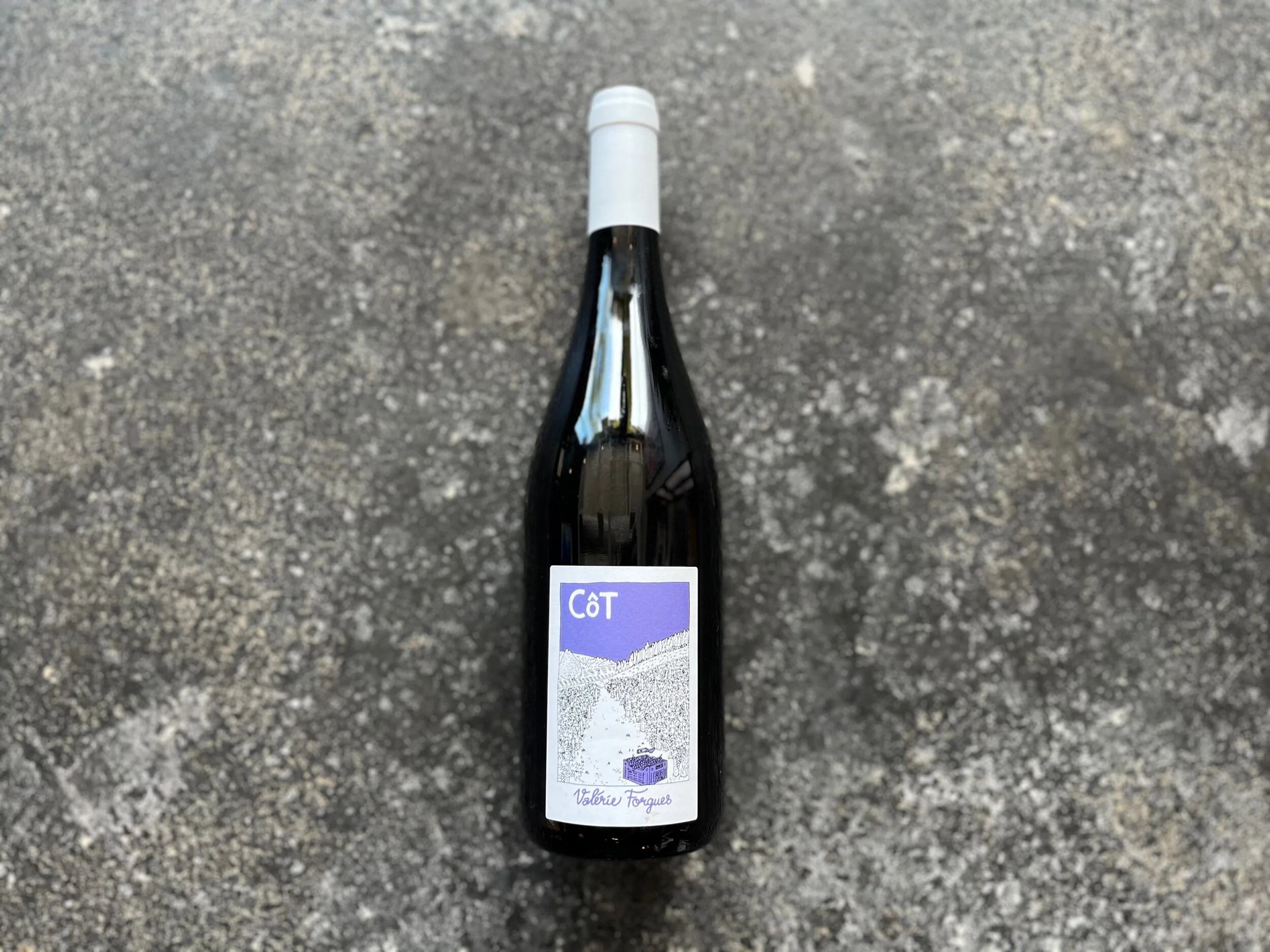Valérie Forgues Côt 2019
Location: France, Loire
Winemaker: Valérie Forgues
Grapes: Côt
Soil: clay, sand, silica
Winemaking: The grapes are destemmed, maceration lasts as long as the wine's alcoholic fermentation. Malo and aging occur in enamel lined tanks and stainless steel. 2.5 grams of S02 are added per hectoliter after fermentation, less than a gram at bottling or none if deemed unnecessary.
From us at M&L: One of the most expressive versions of Côt we’ve seen. This is deep purple joy, bursting with concentrated blueberry, fruit leather, and fig jam. Drink with a very light chill in any season.
From the importer Louis/Dressner: Valérie Forgues' story is one of twists and turns, highs and lows, perseverance and overcoming adversity. The unexpected disciple of Clos Roche Blanche's Didier Barrouillet, she initially had no intention of becoming a vigneronne.
Valérie and her ex-husband purchased Domaine de la Méchinière in the late 1990's. Owning vines had always been a dream of her husband's; Valérie, a young stay at home mother, agreed to the prospect. They chose Touraine because of its proximity to Paris and the affordability of the land. At the time of the acquisition, the estate was worked chemically; already adverse to such practices, the young couple chose to work sustainably under the Terravitis label.
Fast forward to 2008: Valérie finds herself alone with her two sons at the estate. Facing bankruptcy and the possibility of uprooting her sons from the house they grew up in, she decides, despite no viticultural or winemaking experience, to persevere with the 16 hectare estate. Her brother-in-law, a retired vigneron, is there in the early days to help keep things afloat.
Parallel to these events, Valérie had struck up a friendship with her neighbors Catherine Roussel and Didier Barrouillet, who at the time were running the legendary Clos Roche Blanche just five minutes away. Seeing Valérie in need, Didier began off-handedly giving her advice based on his vision of agriculture and winemaking. This philosophy resonated with her deeply.
She kept asking Didier questions, and with every answer was eager to learn more. Things were moving along, and the estate was once again being run sustainably. But Didier believed things could be pushed further, and after a heated argument over converting the estate to organic viticulture, he agreed to help Valérie through the whole process. Today, all 16 hectares are certified organic. Commercial yeasts have been banned from the cellar for many years now, and Didier has guided Valérie with his master's touch in crafting pure, precise wines from Touraine's native grapes.
Still, one final obstacle remained: machine harvesting. Didier had for years argued with Valérie that machine-harvested grapes would always severely lower quality. Just as with converting to organics, her reticence came from the mental-block that running a harvest team would be too much of a risk. But with the 2016 vintage, Valérie finally took the plunge. It was the final step we needed to start working with her, and are happy to report the results are fantastic!
Location: France, Loire
Winemaker: Valérie Forgues
Grapes: Côt
Soil: clay, sand, silica
Winemaking: The grapes are destemmed, maceration lasts as long as the wine's alcoholic fermentation. Malo and aging occur in enamel lined tanks and stainless steel. 2.5 grams of S02 are added per hectoliter after fermentation, less than a gram at bottling or none if deemed unnecessary.
From us at M&L: One of the most expressive versions of Côt we’ve seen. This is deep purple joy, bursting with concentrated blueberry, fruit leather, and fig jam. Drink with a very light chill in any season.
From the importer Louis/Dressner: Valérie Forgues' story is one of twists and turns, highs and lows, perseverance and overcoming adversity. The unexpected disciple of Clos Roche Blanche's Didier Barrouillet, she initially had no intention of becoming a vigneronne.
Valérie and her ex-husband purchased Domaine de la Méchinière in the late 1990's. Owning vines had always been a dream of her husband's; Valérie, a young stay at home mother, agreed to the prospect. They chose Touraine because of its proximity to Paris and the affordability of the land. At the time of the acquisition, the estate was worked chemically; already adverse to such practices, the young couple chose to work sustainably under the Terravitis label.
Fast forward to 2008: Valérie finds herself alone with her two sons at the estate. Facing bankruptcy and the possibility of uprooting her sons from the house they grew up in, she decides, despite no viticultural or winemaking experience, to persevere with the 16 hectare estate. Her brother-in-law, a retired vigneron, is there in the early days to help keep things afloat.
Parallel to these events, Valérie had struck up a friendship with her neighbors Catherine Roussel and Didier Barrouillet, who at the time were running the legendary Clos Roche Blanche just five minutes away. Seeing Valérie in need, Didier began off-handedly giving her advice based on his vision of agriculture and winemaking. This philosophy resonated with her deeply.
She kept asking Didier questions, and with every answer was eager to learn more. Things were moving along, and the estate was once again being run sustainably. But Didier believed things could be pushed further, and after a heated argument over converting the estate to organic viticulture, he agreed to help Valérie through the whole process. Today, all 16 hectares are certified organic. Commercial yeasts have been banned from the cellar for many years now, and Didier has guided Valérie with his master's touch in crafting pure, precise wines from Touraine's native grapes.
Still, one final obstacle remained: machine harvesting. Didier had for years argued with Valérie that machine-harvested grapes would always severely lower quality. Just as with converting to organics, her reticence came from the mental-block that running a harvest team would be too much of a risk. But with the 2016 vintage, Valérie finally took the plunge. It was the final step we needed to start working with her, and are happy to report the results are fantastic!
Location: France, Loire
Winemaker: Valérie Forgues
Grapes: Côt
Soil: clay, sand, silica
Winemaking: The grapes are destemmed, maceration lasts as long as the wine's alcoholic fermentation. Malo and aging occur in enamel lined tanks and stainless steel. 2.5 grams of S02 are added per hectoliter after fermentation, less than a gram at bottling or none if deemed unnecessary.
From us at M&L: One of the most expressive versions of Côt we’ve seen. This is deep purple joy, bursting with concentrated blueberry, fruit leather, and fig jam. Drink with a very light chill in any season.
From the importer Louis/Dressner: Valérie Forgues' story is one of twists and turns, highs and lows, perseverance and overcoming adversity. The unexpected disciple of Clos Roche Blanche's Didier Barrouillet, she initially had no intention of becoming a vigneronne.
Valérie and her ex-husband purchased Domaine de la Méchinière in the late 1990's. Owning vines had always been a dream of her husband's; Valérie, a young stay at home mother, agreed to the prospect. They chose Touraine because of its proximity to Paris and the affordability of the land. At the time of the acquisition, the estate was worked chemically; already adverse to such practices, the young couple chose to work sustainably under the Terravitis label.
Fast forward to 2008: Valérie finds herself alone with her two sons at the estate. Facing bankruptcy and the possibility of uprooting her sons from the house they grew up in, she decides, despite no viticultural or winemaking experience, to persevere with the 16 hectare estate. Her brother-in-law, a retired vigneron, is there in the early days to help keep things afloat.
Parallel to these events, Valérie had struck up a friendship with her neighbors Catherine Roussel and Didier Barrouillet, who at the time were running the legendary Clos Roche Blanche just five minutes away. Seeing Valérie in need, Didier began off-handedly giving her advice based on his vision of agriculture and winemaking. This philosophy resonated with her deeply.
She kept asking Didier questions, and with every answer was eager to learn more. Things were moving along, and the estate was once again being run sustainably. But Didier believed things could be pushed further, and after a heated argument over converting the estate to organic viticulture, he agreed to help Valérie through the whole process. Today, all 16 hectares are certified organic. Commercial yeasts have been banned from the cellar for many years now, and Didier has guided Valérie with his master's touch in crafting pure, precise wines from Touraine's native grapes.
Still, one final obstacle remained: machine harvesting. Didier had for years argued with Valérie that machine-harvested grapes would always severely lower quality. Just as with converting to organics, her reticence came from the mental-block that running a harvest team would be too much of a risk. But with the 2016 vintage, Valérie finally took the plunge. It was the final step we needed to start working with her, and are happy to report the results are fantastic!

